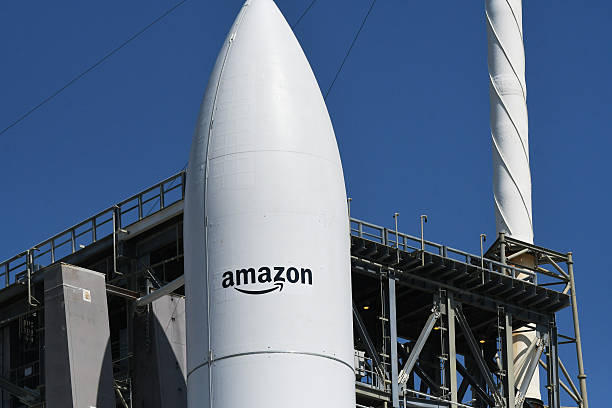
Amazon, pursuing its goal to challenge SpaceX in the internet satellite market, has turned to Elon Musk’s company for its latest batch of Project Kuiper satellites.
Successful Launch of Kuiper Satellites
On Wednesday, a SpaceX Falcon 9 rocket carrying 24 Kuiper satellites launched from Florida’s Space Coast at 2:30 a.m. ET. About an hour later, SpaceX confirmed the successful deployment of all satellites. The launch was livestreamed on X, Musk’s social media platform.
Panos Panay, head of Amazon’s devices and services unit, thanked SpaceX for facilitating the mission. “Congrats to the amazing Amazon Project Kuiper team on another successful launch, and a big thanks to SpaceX for the ride to space,” Panay posted on LinkedIn. “Pumped to have another batch of Kuiper satellites heading into orbit!”
Amazon’s Project Kuiper, launched in 2019, aims to provide broadband internet through a constellation of over 3,000 satellites. The company faces a Federal Communications Commission (FCC) deadline requiring about 1,600 satellites in orbit by July 2026.
Earlier Kuiper launches used United Launch Alliance rockets, with 27 satellites sent up in both April and June. After this launch, Amazon now has 78 Kuiper satellites in orbit. To meet the FCC deadline, the company is ramping up satellite production and launch capacity, having booked up to 83 launches, including three with SpaceX.
The satellite internet battle is part of a broader space competition between Jeff Bezos and Elon Musk, two of the world’s richest men. Beyond Kuiper, Bezos competes with Musk through his rocket company Blue Origin.
In January, Blue Origin conducted the first flight of its New Glenn rocket, intended to rival SpaceX’s reusable Falcon 9. While Blue Origin trails SpaceX in market share, Bezos predicted last year that the venture could eventually surpass Amazon.
Financial Stakes and Market Potential
Kuiper is a major investment for Amazon, with over $10 billion dedicated so far. Analysts at Bank of America estimate the total cost to build the full constellation could reach $23 billion, excluding the expense of building consumer terminals.
Costs this year include $150 million per launch and $1.1 billion projected for satellite production by the fourth quarter.
The satellite internet market is forecast to grow to at least $40 billion by 2030. Bank of America analysts estimate Amazon could capture 30% of that market, generating $7.1 billion in sales from Kuiper by 2032. They noted that with Starlink’s strong early growth, their estimates might even be conservative.
Author’s Opinion
Amazon’s decision to partner with SpaceX despite their rivalry underscores a pragmatic approach to meeting ambitious Kuiper deadlines. While the competition between Bezos and Musk grabs headlines, the collaboration suggests that even industry giants recognize the value of strategic alliances in such capital-intensive, complex ventures. It’s a reminder that innovation often requires cooperation, even among competitors.
Featured image credit: Bhaskar English
For more stories like it, click the +Follow button at the top of this page to follow us.
